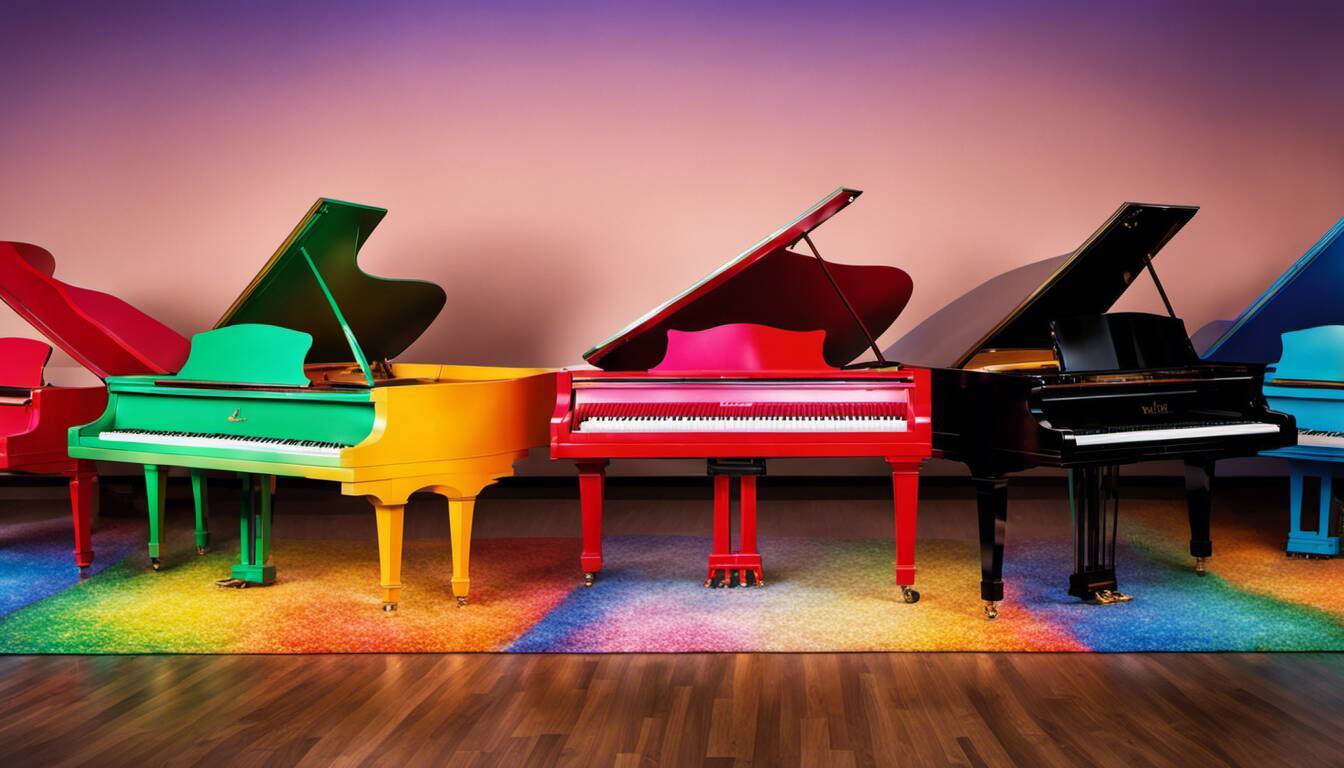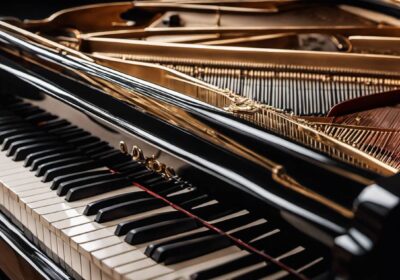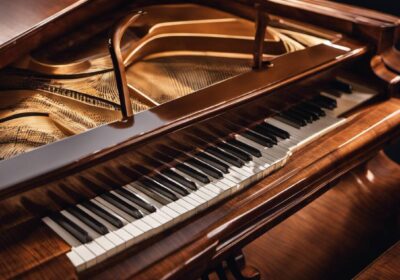Navigating the world of piano lessons can be a labyrinth, especially when you’re not sure what type suits your skill level. Whether you’re an absolute novice with dreams of tickling the ivories or an advanced student hoping to refine your skills, there’s a type of piano lesson that’s perfect for you. In this blog post, we will explore everything from traditional to Suzuki, group to private lessons – offering a comprehensive overview designed to help you choose with confidence. Remember, choosing the correct piano lesson is key in your musical voyage and can potentially unlock untapped potential you never knew existed! So, get ready as we dive headfirst into “The Ultimate Guide to Different Types of Piano Lessons for Beginners and Advanced Students”.
There are several types of piano lessons available, including traditional classical lessons, jazz and blues lessons, pop music lessons, improvisation lessons, and more. Each type of lesson offers a unique focus, allowing students to explore diverse musical styles and techniques. It is important to select a teacher who specializes in the desired style of music.
Private Piano Lessons
Private piano lessons offer a personalized and tailored approach to learning the piano. When opting for private lessons, students have the advantage of one-on-one instruction with a dedicated piano teacher. This individualized attention allows the teacher to understand the student’s strengths, weaknesses, and learning style, enabling them to create a customized lesson plan that suits the student’s specific needs and goals.
In private piano lessons, the student receives undivided attention from the instructor, addressing their unique musical challenges and tailoring the course material accordingly. The teacher can focus on specific areas of improvement such as technique, sight-reading, interpretation, theory, or any other aspect that the student wishes to develop. Additionally, private lessons give students more flexibility in terms of lesson length and frequency.
By working closely with their instructor in private lessons, students are able to progress at their own pace. They receive immediate feedback and guidance on their performance, allowing them to correct mistakes and refine their skills efficiently. The close interaction between teacher and student cultivates a strong mentorship relationship where the student feels supported and motivated to excel.
- Private piano lessons provide a highly individualized and personalized learning experience that caters to the student’s specific strengths, weaknesses, and learning style. With one-on-one attention from a dedicated teacher, students can focus on particular areas of improvement, progress at their own pace, receive immediate feedback and guidance on their performance, and develop a strong mentorship relationship with their instructor. Additionally, private lessons offer more flexibility in terms of lesson length and frequency compared to group lessons, making it easier for students to fit music education into their schedules.
Who Should Opt for Private Piano Lessons?
Private piano lessons are suitable for individuals of all ages and skill levels who seek a focused and individualized learning experience. Beginners often benefit from private lessons as they receive a solid foundation in proper technique, hand position, fingering, and note reading right from the start. This ensures that they develop good habits early on and lay the groundwork for future success in their piano journey.
For advanced students, private piano lessons offer an opportunity to explore complex repertoire, tackle intricate musical concepts, delve into music theory at a deeper level, fine-tune their technique, or even prepare for auditions or competitions. Advanced students may have specific goals they want to achieve in their musical journey, and private lessons provide the guidance and support needed to accomplish those goals.
Moreover, individuals who prefer a personalized approach or have specific learning preferences can greatly benefit from the individual attention and flexibility offered by private lessons. Whether someone wants to pursue a career in music, play for personal enjoyment, or simply enhance their musical skills, private piano lessons provide a tailored experience that caters to their unique needs and aspirations.
Now that we have discussed the many advantages of private piano lessons and identified who might benefit from them, let’s explore another option: group piano lessons.
Group Piano Lessons
Group piano lessons are a popular option for beginners and advanced students alike. In these lessons, multiple students learn together in a group setting under the guidance of an experienced piano teacher. This format offers several advantages to individuals looking to start or further their piano journey.
One of the main benefits of group piano lessons is the opportunity for social interaction and collaboration. Interacting with fellow students fosters a sense of camaraderie and support, creating a motivating environment. Students can learn from one another, share their experiences, and even collaborate on musical pieces. This dynamic can enhance the learning experience and make it more enjoyable.
Imagine being part of a group where you get to hear different interpretations of a musical piece and discuss various techniques and strategies with your peers. This collaborative environment can inspire creativity and push you to explore new possibilities in your piano playing.
Additionally, group piano lessons often have a more affordable price point compared to one-on-one lessons. Sharing the cost among multiple students allows for a more budget-friendly option without compromising on quality instruction.
Here is a comparison between group piano lessons and private one-on-one lessons:
| Group Piano Lessons | Private One-on-One Lessons |
|---|---|
| Social interaction and collaboration | Individual attention and tailored instruction |
| More affordable | Higher cost |
| Opportunities for ensemble playing | Focus on personal progress |
| Enhanced motivation through peer support | Direct feedback from the teacher |
While group piano lessons offer numerous benefits, it’s important to note that individual attention may be limited compared to private lessons. In a group setting, the teacher needs to cater to multiple students’ needs simultaneously, which may result in less personalized instruction. However, this limitation can be mitigated if the group size is kept small, allowing the teacher to provide some individualized guidance when needed.
Now that we understand the basics of group piano lessons, let’s dive deeper into the dynamics of these interactive learning sessions.
- According to a survey conducted by the Music Teachers National Association, 64% of piano tutors reported that they offer classical piano lessons.
- The same study showed that around 27% of teachers also offered jazz improvisation as part of their curriculum, presenting an alternate approach to traditional piano instruction.
- In addition, over 40% of these music teachers incorporated ear training and sight-reading into their teaching methods, demonstrating the varied skills developed in comprehensive piano tuition.
The Dynamics of Group Piano Lessons
Group piano lessons are designed to foster a collaborative and interactive learning environment. These lessons typically involve a combination of individual practice time, ensemble playing, and group activities tailored to the needs of the students.
During group piano lessons, students receive guidance from the instructor while also having opportunities for peer feedback. This allows them to develop their playing skills while receiving support and encouragement from both the teacher and their fellow students. Interacting with others can boost motivation, as students witness one another’s progress and share in each other’s successes.
Picture yourself sitting side by side with other enthusiastic learners as you engage in fun activities that reinforce music theory concepts, rhythm exercises, or sight-reading challenges. Collaborative games may keep you on your toes as you work together to solve musical puzzles or improvise in real-time.
In addition to individual study, ensemble playing is a key component of group piano lessons. Students have the chance to play alongside their peers, developing essential skills such as listening, timing, and coordination. Ensemble playing can be an enriching experience, as you learn to blend your sound with others and create harmonies together.
Here are some key aspects of group piano lessons:
| Collaboration and teamwork | Ensemble playing |
|---|---|
| Peer feedback and support | Interactive group activities |
| Motivating atmosphere | Development of listening and coordination skills |
Whether you’re a beginner seeking camaraderie or an advanced student looking for new musical perspectives, group piano lessons offer a dynamic and engaging learning experience that can enhance your musical journey.
Class-Based Piano Lessons
Class-based piano lessons provide a unique and dynamic learning environment for both beginner and advanced students. In these group settings, students have the opportunity to interact with their peers, fostering a sense of camaraderie and musical collaboration. The classes are usually led by an experienced piano teacher who guides the students through various exercises, techniques, and repertoire. It allows for a structured approach to learning while also offering a social aspect that can be beneficial for some learners.
Now that we understand what class-based piano lessons are, let’s explore the advantages they offer to students.
Advantages of Class-Based Piano Lessons
- Social Interaction: One of the significant benefits of class-based piano lessons is the opportunity for social interaction. Students can engage with their peers, learn from each other, and share their musical experiences. This interaction can improve motivation, build friendships, and create a supportive learning community.
- Collaborative Learning: Working alongside fellow students in a class setting encourages collaborative learning. Students can play duets or ensemble pieces together, enhancing their listening skills, timing, and ability to play with others. Collaboration promotes teamwork and develops important musical skills that may not be emphasized in private lessons.
- Performance Opportunities: Class-based piano lessons often include regular performance opportunities where students showcase their progress in front of their peers. These performances help build confidence and develop stage presence early on. They also provide valuable experience in handling nerves and performing in front of an audience.
- Cost-Effective: Compared to private lessons, class-based piano lessons can be more cost-effective as the instruction fee is divided among multiple students in the class. This makes it an attractive option for those looking for quality instruction at a lower price point while still receiving valuable guidance from an experienced teacher.
- Structured Curriculum: In a class setting, there is often a structured curriculum that covers various aspects of piano playing, such as technique, music theory, sight-reading skills, and repertoire. The curriculum ensures that students are exposed to a well-rounded musical education and progress appropriately according to their level of proficiency.
For example, in a class-based piano lesson, beginner students may start with learning basic hand positions and fingerings together, while advanced students can delve into more complex techniques and challenging repertoire.
While class-based piano lessons offer numerous advantages, it is essential to consider individual preferences and learning styles. Some students may thrive in group settings, while others might prefer one-on-one attention in private lessons.
Specialized Piano Lessons: Jazz and Pop
For those looking to explore different styles of music through their piano journey, specialized lessons in jazz and pop offer an exciting and unique approach. By delving into these genres, students can expand their musical horizons and develop skills beyond classical training. Jazz piano lessons focus on improvisation, chord progressions, and rhythmic techniques that allow for artistic expression and creativity. On the other hand, pop piano lessons emphasize playing by ear, understanding contemporary music styles, and accompanying vocals or other instruments. These specialized lessons cater to students who want to explore different avenues of music and develop a versatile repertoire.
Benefits of Music Style Focus Piano Lessons
Engaging in music style focus piano lessons, such as jazz or pop, brings forth a multitude of benefits for both beginners and advanced students. Firstly, it allows students to develop improvisation skills, enabling them to think on their feet and create music in the moment. This enhances their overall musicianship as they learn to understand harmony, melody, and rhythm intuitively. Additionally, jazz and pop lessons promote playing by ear, which trains the student’s ability to pick up melodies and chords without relying solely on sheet music. This invaluable skill opens doors to playing with others in jam sessions or bands.
Moreover, specialized piano lessons provide students with exposure to various musical techniques specific to each genre. Jazz piano focuses heavily on chords, voicings, and complex harmonies that can spark creativity in composition or soloing. In contrast, pop piano emphasizes chord progressions commonly found in popular songs, allowing students to play along effortlessly with their favorite tunes.
Consider a beginner student who initially learns classical pieces but later decides to take jazz piano lessons. As they start studying jazz concepts like swing rhythm and improvisation techniques, they notice how their overall sense of rhythm improves. They become more comfortable with syncopated rhythms commonly found in jazz music and develop a deeper understanding of how rhythm interacts with harmony and melody.
By exploring different music styles, students gain a more holistic approach to their piano playing. They develop versatility as they can adapt to different genres and musical contexts. This also nurtures their creativity, as they become adept at interpreting and adding personal touches to the music they play.




